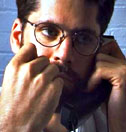
Movie Guru Rating:

Comment
on this review
| |

The upstarts of Startup.com think they're going to change the world. They're wrong.
by Jesse Fox Mayshark
There's one scene in Startup.com that, more than any other, symbolizes the era and errors (of judgment, of perspective, and especially of youth) captured so sharply in the documentary's fuzzy video frames. Kaleil Isaza Tuzman, the 20-something CEO of an Internet company, is shown in a C-SPAN clip attending a roundtable discussion chaired by President Bill Clinton. They're talking about the impact of technology on citizen involvement with government. At the end of the meeting, Tuzman shakes Clinton's hand and gives the president a business card. Back in his Manhattan office, one of Tuzman's co-workers asks him about it. "I offered him a job," Tuzman says, with the broad, confident grin that enabled him to raise $50 million from investors. "I said, you know, once he's out of office, if Hillary wins New York..."
Think about that. Here was a kid just a few years out of school, not only counseling the leader of the free world on the ins and outs of the "new economy," but casually offering him employment to boot. Oh, what a time it was.
The most amazing thing about watching Startup.com, an adroit and even poignant relic from a brief, strange wonderland, is realizing how recent it all was. Was it really just two or three years ago that everybody from bankers to rock stars to heads of state were desperately scrambling to keep up with the dot-com boom, to stake a claim in the wild frontier of the World Wide Web? Did we really believe everyone was going to get rich overnight? Were we really that naive?
Well, not all of us were, of course. Part of the satisfaction in watching the movie as a non-dot-commer is seeing all of your skepticism and suspicions about the phenomenon confirmed in spades. But at the same time, there's no denying that our entire culture, at some level, got caught up in the endless upward climb of the NASDAQ, the techno-jargoned world of B2C and B2B and e-commerce, the golden promise of those little letters "www." For a little while, we got used to the idea that the future was here and it was under the command of dazzling young turks who wore backward baseball caps to the office and never left home without a phone in one hand and a Palm Pilot in the other.
Young turks like Tuzman. Startup.com begins with him cleaning out his desk at Goldman Sachs, where he apparently had a bright future, to join his high school buddy Tom Herman in founding an Internet company called govWorks.com. Their goal is to create an online site where people all over the country (and, indeed, the world) can pay parking tickets, renew driver's licenses, apply for permits and conduct all manner of civic business.
It wasn't a bad idea. Nor, it turns out, a unique one—even as Tuzman jets from New York to Silicon Valley trying to raise cash from venture capitalists, other upstart start-ups are mapping out the same territory. And contrary to what in retrospect seems like rampant recklessness by investors, the powerful firms Tuzman visits are no soft touches. In those scenes (filmed from outside office windows, in some of the rare instances where the filmmakers were denied total access), you get the sense of some frisky kids trying hard to impress the grown-ups. That sense never disappears.
In fact, one thing the movie forces you to consider is that Wall Street and the media's mad embrace of the dot-com revolution was as much driven by youth worship as by technology. In America, we love the young, hip and successful, and for a while, they were all working in cyberspace.
But Startup.com, to its credit, doesn't force lessons or morals from its story. Directors Chris Hegedus and Jehane Noujaim had no idea what they were in for when they started the movie. Tuzman was Noujaim's college roommate, and he provided entrée into what seemed like a fascinating new world. Hegedus had co-directed the Clinton campaign documentary The War Room with legendary filmmaker D.A. Penne- baker (Pennebaker served as producer on Startup.com), and she takes a similar tack here, a no-nonsense you-are-there approach.
govWorks grows with amazing speed, zooming from eight to 200 employees in just over six months. Tuzman becomes a mini-celebrity, featured in countless newspaper, magazine and doting cable TV reports on the wonders of the Internet economy. But then the competitors move in, the bills come due, and the investors start making noise. A series of painful decisions culminates with Tuzman firing Herman, and the scenes where the two of them try valiantly to rescue their friendship are among the most affecting in the movie. (Fortunately for them and the filmmakers, they're both basically likable despite their hubris and self-delusions.)
And then, of course, it all comes apart. The camera pans across an office full of empty cubicles. The dream is over, less than two years after it began. It seems equal parts sad, fitting and deserved, this rapid tumble following such an unreasonable ascension. It doesn't exactly qualify as tragedy—when you see Tuzman and Herman working out together at their Manhattan gym six months later, they both seem a little shell-shocked but hardly scarred for life. It was, they conclude, fun while it lasted. So is Startup.com.

July 19, 2001 * Vol. 11, No. 29
© 2000 Metro Pulse
|